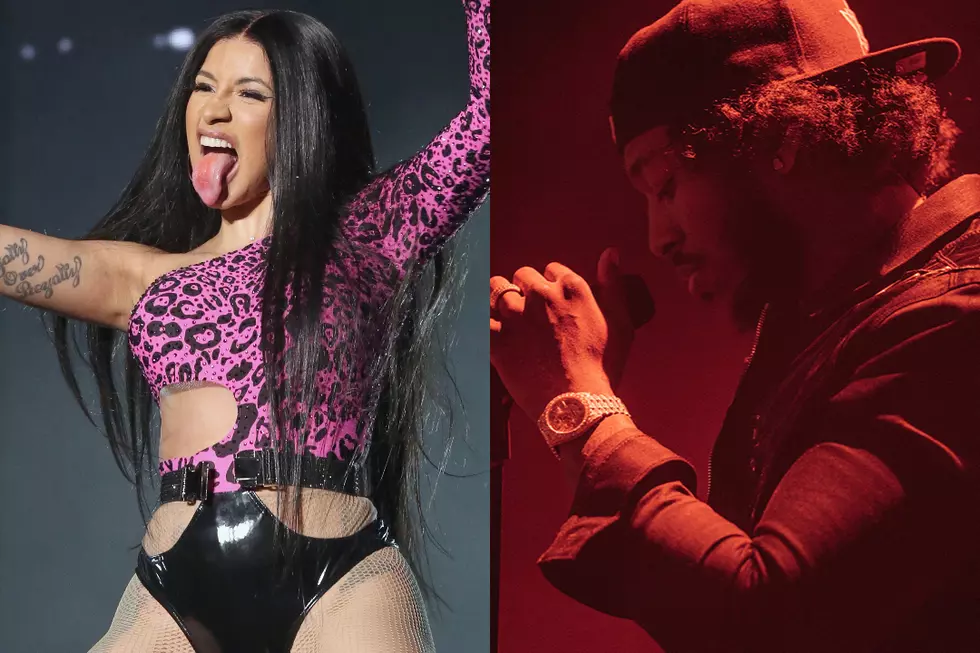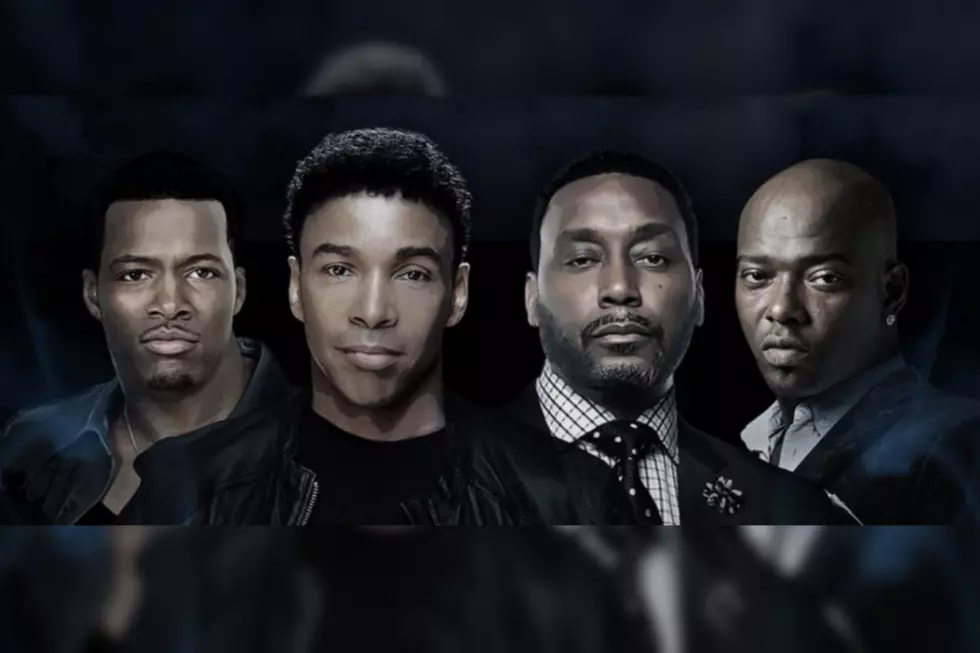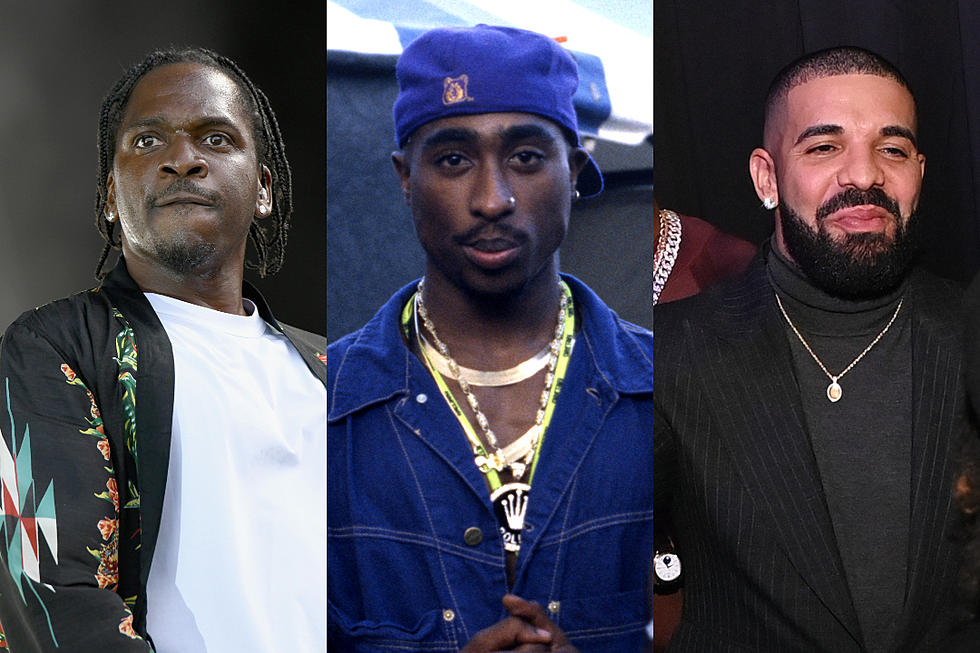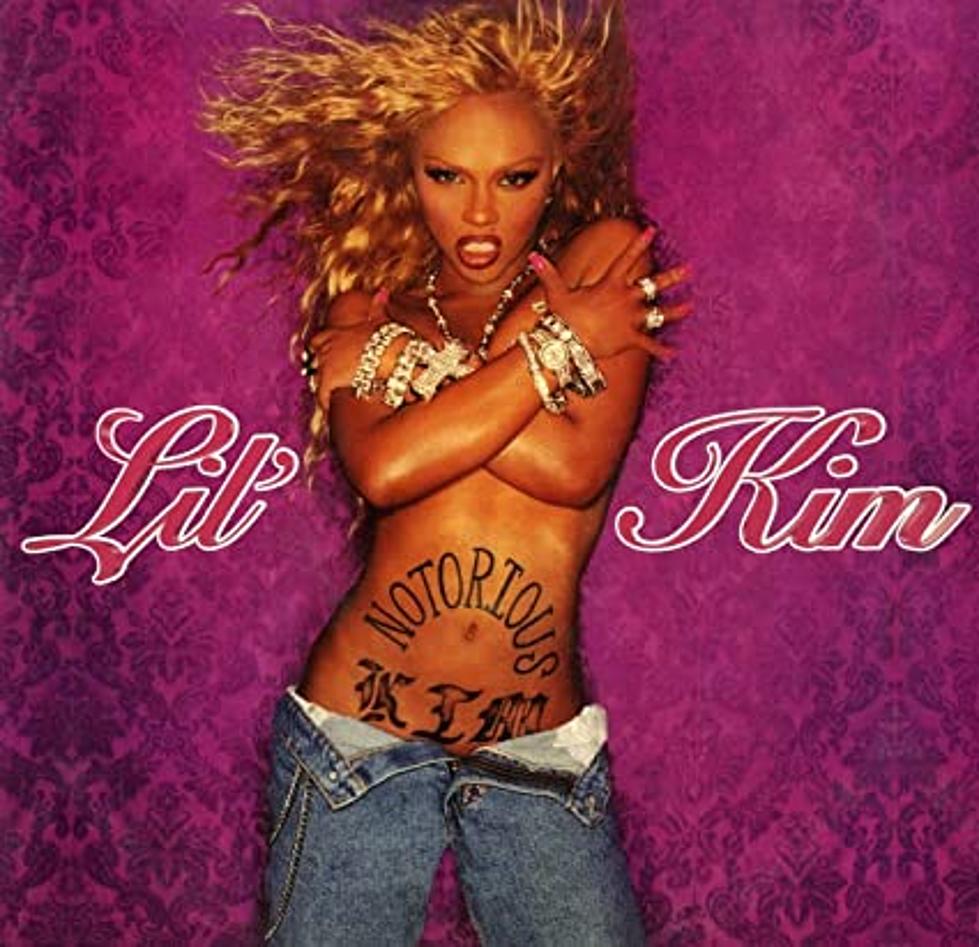
Ghostwriting’s Uneven Playing Field Between Men and Women Analyzed
Double Standard
Ghostwriting has forever been a hip-hop taboo, yet female rappers who employ outside pens are consistently critiqued more harshly than their male counterparts. XXL analyzes the uneven playing field.
Words: Keith Murphy
Editor’s Note: This story originally appeared in the Winter 2019 issue of XXL Magazine, on stands now.
Before Roxanne Shanté became a pioneering, genre-shifting hip-hop goddess, she was a 14-year-old kid who rhymed against local MCs for money at New York’s storied Queensbridge Houses. It didn’t take long for the cocky spitter to become champ of her Long Island City ’hood. “I think what surprised people is when I would show up for battles they realized that I was a little girl,” laughs Shanté, now 50, who today hosts a popular radio show on SiriusXM’s Rock The Bells channel billed Have A Nice Day. “Most of them just came because they wanted to battle whoever the champion was. But they didn’t know the champion was me.”
Shanté’s turbulent journey to hip-hop greatness was captured in the acclaimed 2017 biopic Roxanne Roxanne. She literally went from folding laundry to recording her groundbreaking 1985 debut single, “Roxanne’s Revenge,” a bold answer record to UTFO’s 1984 hit “Roxanne, Roxanne.” “I’m conceited, never beated, never heard of defeated,” she jabbed, landing the ferocious, off-the-head freestyle in just one take. With the studio guidance of future super-producer Marley Marl, Shanté single-handedly created the template for every female lyricist who would follow.
But as the hip-hop biz evolved in the 1980s and early 1990s into a highly competitive, commercial industry driven by platinum expectations, sold-out arena tours, Yo! MTV Raps co-signed music videos, fashion lines and movies, the stakes became even higher for Shanté and her peers. Subsequent two-fisted and, at times, profane tracks like “Go on Girl,” “Big Mama,” “Live On Stage” and “Brothers Ain’t Shit” projected a much harder, more street feel. Along with the aforementioned Marley and MC Shan, Shanté was now a founding member of the legendary hip-hop collective the Juice Crew, which also boasted next-wave talent Biz Markie, Big Daddy Kane, Kool G Rap, Masta Ace and Craig G.
Soon, the talk became not just what Shanté was rhyming about, but who was writing for her. “I only worked with my Juice Crew brothers,” she recalls. “It was a family thing, so I was never worried about people saying, ‘Oh, Kane wrote that for you’ or, ‘Oh, that sounds like G. Rap.’ Yes, Big Daddy Kane sure the fuck did write that rhyme for me. And if it sounds like Kool G Rap, it should. He wrote it.”
However, Shanté makes clear that she has never used ghostwriters in the literal sense. Indeed, on the credits of some of her records, you can clearly spot the names of her notable collaborators. “I could never just pick a rhyme out of a box like some of the newer female rappers,” she says. “It was [still] competitive. Everybody was questioning everybody’s skills back then. But if it was your crew, and you had something that sounded like it would be good for [someone else in the group], there was no jealousy or envy. [We] wanted to see the entire team rise.”
And it’s true. Not only did Kane write some rhymes for Shanté, he also blessed Biz Markie on several of his go-to tracks, including “Nobody Beats the Biz” and “Vapors.” That same collective mindset also fueled the Flavor Unit, the New Jersey rhyme crew led by Grammy-winning, Oscar-nominated Queen Latifah, Naughty By Nature, Chill Rob G and producer DJ Mark the 45 King. Late member Apache and relentless wordsmith Treach helped co-write some of Latifah’s biggest records.
Still, the passionate debate over ghostwriting is as long as it is dizzyingly complex. It’s certainly been a point of contention ever since the late Big Bank Hank “borrowed” Grandmaster Caz’s rhymes for his iconic verse on hip-hop’s first historic commercial breakthrough, The Sugarhill Gang’s 1979 game-changer “Rapper’s Delight.” But, while ghostwriting is viewed as anathema for hip-hop purists who believe that the primary skill set of a true MC is writing your own rhymes, women in hip-hop have oftentimes faced heavier scrutiny on the matter.
“It’s rare to hear women who are great writers who have written for their male counterparts say they ghostwrote a rhyme,” adds Shanté. “But a man will say it in a heartbeat that he wrote your rhyme. Women are always under scrutiny—even if they write their own lyrics.”
Houston’s Megan Thee Stallion is one of rap’s hottest rising stars. The 2019 XXL Freshman has quickly earned a reputation as one of today’s sharpest freestylers, male or female. But, that hasn’t stopped the “Hot Girl Summer” rhymer from having to push back against unsubstantiated ghostwriting rumors. “I write all my own shit don’t let nobody gas you up like that,” Megan bristled on Instagram last May when singer Wolftyla alleged that she wrote some of the Juicy J-produced track “Simon Says,” a claim that has since been disproven. “That clout shit crazy.”
When Cardi B won Songwriter of the Year at the ASCAP Rhythm & Soul Awards back in June of 2019 for her work on the multiplatinum radio hits "Bodak Yellow," “Bartier Cardi” and “I Like It,” the Bronx superstar, who doesn’t hide the fact that she has used co-writers such as Pardison Fontaine and Nija Charles, received push back on social media as detractors questioned the legitimacy of her rhyme contributions. “Everybody be trying to come at my throat because people wanna say that I don’t write a lot of my shit,” she said on Instagram in November of 2018. “And I write a lot of my shit. That’s the funny shit. I be letting y’all talk because I don’t give a fuck, but a bitch can fucking write. You just gotta sit down and fucking think. What is hard about that?”
Yet, when you consider that some of hip-hop’s most storied male talents have either worked with other lyricists, publicly recorded the rhymes of other rappers or have used ghostwriters, such uproar reeks of a double standard. Run-DMC, arguably the most influential hip-hop act of all time, issued songwriting credits to a 16-year-old LL Cool J on the group’s 1985 single “Can You Rock It Like This.” A year later, Run and D wrote the Beastie Boys’ “Slow and Low.” N.W.A’s Ice Cube famously penned lyrics for the monumental reality-rap staples “Boyz-n-the-Hood,” “Straight Outta Compton,” “Fuck tha Police” and “Express Yourself.” D.O.C. wrote extensively on Eazy E’s double-platinum 1988 solo debut, Eazy-Duz-It. The respected No One Can Do It Better scribe and California’s beloved native son Snoop Dogg were also prominent lyricists on West Coast production god Dr. Dre’s landmark 1992 work, The Chronic.
Indeed, ghostwriting is as hip-hop as graffiti, Shell Toe Adidas and diss records. More than 30 years after “Rapper’s Delight,” Drake found himself briefly mired in controversy when then-rival Meek Mill claimed that Quentin Miller was ghostwriting for the Toronto idol. In July of 2015, DJ Funkmaster Flex added more fuel to the bonfire when he played a series of reference tracks by Quentin Miller that were later recorded by Drake. Miller refuted any suggestion that he was secretly behind some of the songs from the best-selling rapper of the decade, emphatically stating on Tumblr, “I am not, and never will be a ghostwriter for Drake.”
The Wu-Tang Clan’s Method Man has spoken openly about his late Shaolin brethren Ol’ Dirty Bastard’s debut work featuring lyrics by the RZA and GZA. Big Pun’s widow Liza Rios has claimed that the celebrated lyricist on occasion wrote for Fat Joe. Billionaire rhyme king Jay-Z flexed his sizable skills for both the aforementioned Dr. Dre and Snoop Dogg on 1999’s epic “Still D.R.E.” And CyHi The Prynce is credited with writing on four tracks on Travis Scott’s double-platinum 2018 album, Astroworld.
“Ghostwriting has evolved,” says Sauce Money, one of rap’s most prolific writers for hire. It was the Grammy-holding, Brooklyn-born MC who composed the heartfelt verses on Sean “Puff Daddy” Combs’ 1997 classic The Notorious B.I.G. tribute, “I’ll Be Missing You.” “People don’t really care about the process anymore,” Sauce continues. “They care about the finished product. It’s not as important to have your own pen. People don’t mind you getting help from another rapper as long as the record is hot.”
However, while unproven ghostwriting accusations have had little impact on the legacy of Drake or the Kardashian-propelled career trajectory of Travis Scott—both remain top draws in the music world—as well as other male headliners like Kanye West (it’s well-known that the polarizing Sunday Service leader has outside writers over the years, such as fellow Chicago MC Rhymefest, for his seminal 2004 award-winning spiritual statement “Jesus Walks”), the same cannot be said for female rappers.
For Skyy Hook, journalist and on-air personality on The Wake Up Show, the bias treatment towards female rap artists is glaringly evident. “I’m not a huge fan of Iggy Azalea,” she says of the Australian rapper, a former protégé of Atlanta trap king T.I. “But, when Tip can come out and say she ruined his legacy because he brought her into the game, that’s a disposable reaction to women rappers.”
Even the most revered women in rap have been the subject of ghostwriting claims. MC Lyte has long been praised as one of the lyrical greats, universally respected by her peers. In 1987, Boogie Down Productions’ legendary KRS-One brought together some of hip-hop’s greatest voices, including Public Enemy, the late Heavy D, Kool Moe Dee, Doug E. Fresh, Stetsasonic and Lyte, for the all-star, anti-Black-on-Black violence record “Self Destruction.”
The iconic LL Cool J wanted to be involved, but he was reportedly stopped by Def Jam Recordings label boss Russell Simmons, who viewed the song as too political for Ladies Love Cool James. Mr. Smith, however, defied Simmons. “What a lot [of] y’all don’t know is I wrote MC Lyte’s verse and she killed it,” LL recently recalled on Instagram of Lyte’s unforgettable “Funky fresh dressed to impress, ready to party” rhyme. The heartfelt collaboration was for a great cause. Despite Lyte being widely known for her serious pen game, Twista claimed in a 2012 interview on MsDramaTV, “If you study back and look at the first rap songs that came out, some of the rappers didn’t write lyrics [to] some of their songs….Like LL helped MC Lyte write certain songs…” The problem with the fast-tongued lyricist’s comments is the erroneous suggestion that Lyte received help on several tracks.
It doesn’t end there. In his 2012 memoir, Purpose: An Immigrant’s Story, former Fugees frontman Wyclef Jean curiously tried to take credit for some of Lauryn Hill’s earlier output. Nicki Minaj, who last February became the first female rapper to top 100 million units including albums, singles and features, has long fought off ghostwriting queries. “Someone [really] just asked if Eminem wrote my verse,” she wrote back in May of 2018 on social media, addressing her part on YG’s “Big Bank.” The comment came after Nicki playfully said she was dating Slim Shady. “All the REAL rappers in the game know & give me my props. Y’all try to take away everything from women. But just know: even when it’s no longer ‘trendy’ to write ur raps I will always write my own!!!”
For years, Salt-N-Pepa, one of the most successful and enduring female acts in music history, has battled for control over the group’s artistic vision. Throughout much of their 1980’s platinum run, the door-opening hip-hop group recorded under the tight direction of manager/producer/star-maker Hurby “Luv Bug” Azor. Salt, Pep and DJ Spinderella proved themselves to be dynamic, influential performers on classic songs such as “My Mic Sounds Nice,” “Tramp,” “Push It,” “Get Up Everybody (Get Up)” and “Let’s Talk About Sex.” But Hurby and other writers, including, interestingly enough, Kool G Rap, penned a bulk of their material and the women set out to change that.
“We put our foot down a lot more with Hurby,” said Salt in a 1994 New York Magazine profile. But when the duo approached Hurby with lyrics to a new song titled “Shoop,” which would go on to become a Top 5 Billboard pop hit, he balked at the notion. “He was shooting ‘Shoop’ down!” exclaimed Pep to the publication. “He said it wasn’t gonna go gold. I wrote it! He kind of fought us because it wasn’t one of his songs, I guess. He had to eat those words!”
And therein lies what’s at the center of this at-times misogynistic exercise. With the fundamental power dynamic tilted heavily towards male managers, music executives and producers, female MCs have often found themselves navigating the well-worn terrain of gender politics. Yes, it’s true that some of rap’s most commercially successful female rappers have had male collaborators or have performed ghostwritten material by men. Whether it’s Da Brat and Jermaine Dupri, Lil’ Kim and The Notorious B.I.G. or Foxy Brown and Jay-Z, such powerful pairings have created some of the genre’s finest moments. But those same creative unions should not take away from the overall talents of these iconic women.
Lil’ Kim, who was able to move from the enormous shadow of Biggie following his tragic shooting death in 1997, doesn’t get enough credit for penning some of her best moments on wax, such as her song-stealing appearance on Mobb Deep’s excellent “Quiet Storm (Remix).” The late Prodigy testified to Kim’s lyrical brinkmanship. “Rumors had been going around that Kim didn’t write any of her music,’” Prodigy wrote in the 2011 book, My Infamous Life: The Autobiography of Mobb Deep’s Prodigy, “I was impressed when I saw how Kim killed her verse and wrote it herself.”
Oftentimes women in rap have been judged more on the merits of their male collaborators than the fact that they are enduring forces of nature on the mic. “In the past, if a woman wasn’t co-signed by the right dude, that was already one mark against her,” says Skyy Hook. “I think that’s why you have to [applaud] newer girls like Megan [Thee Stallion]. She is kicking in the door for herself. I don’t think she even knows her own power. She’s just scratching the surface.”
Today, Hot Girl Meg is part of the deepest roster of diverse women MCs in recent memory. When saucy Bay Area princess Saweetie made her Billboard Hot 100 chart debut last July with her audacious anthem, “My Type,” she joined Megan Thee Stallion, Cardi B, Iggy Azalea, Lizzo, Nicki Minaj and the City Girls duo (Yung Miami and JT) as the seventh female rhyme act to hit the charts this year (the most of any year this decade). From the surreal lyricism of Tierra Whack and the fearless social consciousness of Rapsody to the street-laced attitude of Young M.A, any talk of who’s writing for whom sounds trivial when female rappers are killing the game. “Women MCs are the heartbeat of hip-hop right now,” praises Sauce Money. “If you are a male artist today, you have to compete with the upper echelon of female artists.”
As for Shanté, she’s still taking on all comers. “I am not ashamed to say that people have written for me because when it comes to freestyling, I’m unmatched,” she says in a ballsy, matter-of-fact tone that you would expect from a Queensbridge champion. “If you want to battle, we could clear that up right now.”
Check out more from XXL’s Winter 2019 issue including our Travis Scott cover story, the uneven playing field in ghostwriting analyzed and interviews with Moneybagg Yo, Young M.A, Consequence and his son Caiden, and Doja Cat plus Show & Prove features with Pop Smoke, Calboy and Lil Tjay.
Travis Scott's Winter 2019 Cover Story Photo Shoot
More From KOOC-FM










